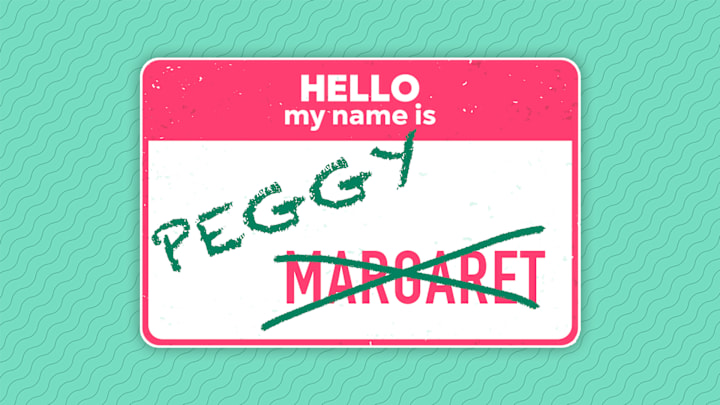Margaret has plenty of nicknames that make sense: Marge, Maggie, Margo. And then there’s Peggy, which looks like a better fit for Paige or even Penelope. But upon closer investigation, what seems unconventional actually exemplifies a classic nicknaming convention.
- Why Is Peggy Short for Margaret?
- Why Is Polly a Nickname for Mary?
- Why Is Daisy a Nickname for Margaret?
- Why Did People Make Up So Many Nicknames?
Why Is Peggy Short for Margaret?
In the Middle Ages and beyond, people created new pet names by rhyming existing ones. Many are still in our regular rotation, like Bill (from Will/William), Bob (from Rob/Robert), and Dick (from Rick/Richard). Others haven’t survived. In The Oxford Dictionary of English Christian Names, Elizabeth Gidley Withycombe points out that rhyming nicknames starting with H have especially lacked staying power (she doesn’t hypothesize why). Examples include Hob for Robert, Hick and Hitch for Richard, and even Hibb for Isabel (rhymed from Ib).
When the rhyme is based on a nickname that was already substantially altered from the full name, it’s not always obvious how it came to be. The connection can be even cloudier if the original nickname is no longer very common—or it’s now more heavily associated with a different name. That’s the case with Peggy: Margaret begot Meg and Mog, which became Peg(gy) and Pog(gy). These days, since Meg is often short for Megan, we don’t recognize it as the bridge between Margaret and Peggy. But Megan originated as the Welsh version of Margaret.
Why Is Polly a Nickname for Mary?

A similar thing happened with Polly. Molly began as a nickname for Mary, and people rhymed it to get Polly. Since Molly is now a full name in its own right, we forget that it once bridged Mary and Polly—making Polly seem much more random than it is. (How it became the go-to name for parrots is a whole other story.)
Why Is Daisy a Nickname for Margaret?

Peggy isn’t the only seemingly random sobriquet for Margaret. There’s also Daisy, which, like Peggy, turns out to have a pretty simple explanation: Marguerite is French for “daisy.” French parents have been naming their daughters Marguerite since the days of Old French; it has roots in a Greek word for “pearl” (which may have a Persian origin).
Why Did People Make Up So Many Nicknames?
Why this historical obsession with not using your full name? Some scholars have brought up the age-old belief that knowing someone’s true name grants you power over them (think Rumpelstiltskin). That’s all well and good as long as your intentions are pure, but witches, demons, and other evil forces might exploit the knowledge for nefarious purposes; ergo, people may have felt safer going by something else.
But it’s hard to believe that a sorcerer couldn’t guess Margaret from Maggie. In all likelihood, these kinds of rhymes and riffs were often just a practicality. During the late medieval period, as surnames gained popularity and European communities became more closely knit, variation in first names shrank dramatically. With only so many monikers in circulation—and with such a big focus on passing names down—your baby Robert wouldn’t be the only Robert around. If one already answered to “Rob” and another to “Bob,” you might start calling yours “Hob” for clarity’s sake.

The trend continued long after that era. Take Little Women’s multiple Margarets: Matriarch Margaret March is known as Marmee; eldest daughter Margaret is Meg; and Meg’s daughter is called “Daisy,” as Amy March explains, “so as not to have two Megs.” (Never mind that some characters call Meg March “Daisy” earlier in the story.)
Even now, when offbeat names are more common, we still rely on nicknames to differentiate us. Maybe your class had a Katherine, a Katie, a Kate, and a Kat. Maybe you’re a James Jr. who goes by Jimmy. Thankfully, we’ve at least retired the more dreadful medieval offerings: Some Margarets answered to “Maggot.”
Learn More About Names:
